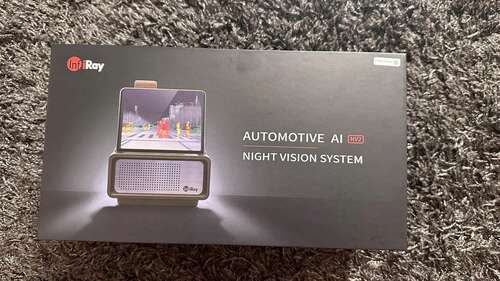
InfiRay NV2 automotive thermal camera. Adrian Kingsley-Hughes/ZDNET
ZDNET’s key takeaways
- InfiRay NV2 automotive thermal camera is available from Amazon for $599.
- Great thermal camera, AI hazard detection works great, and the kit is easy to fit.
- No microSD card slot for recording.
Modern cars are packed with high-tech features that have made them safer for people in the vehicle and others on the road. But weather can still present a big challenge, because if you can’t see a hazard, or don’t see it soon enough, you can find yourself in trouble in the blink of an eye.
Also: I tested one of the cheapest portable power stations and it made road-tripping a breeze
It would be great to receive a warning of a hazard as soon as possible, and this kind of alert is what the InfiRay NV2 automotive thermal camera aims to offer. The camera looks to enhance driving safety by combining AI technology, which identifies vehicles, pedestrians, and animals, with a thermal camera capable of piercing through pitch darkness, glare, fog, rain, or snow.
InfiRay NV2 features
- Extended night vision of up to 200 meters
- NV2 responds in 0.1 seconds to pedestrians, animals, or obstacles
- User-friendly installation options
- Thermal camera has a resolution of 384×288
- Thermal camera is IP67-rated to prevent water and dust intrusion, and features automatic defrosting
The NV2 kit comes with everything you need. The kit includes the thermal camera, an in-car display, wiring for connectivity, an in-car power supply, and all necessary brackets and screws for a proper installation.
For the purposes of this review, I temporarily fixed the unit to my vehicle using a magnetic mount on a clamp, so I could test various configurations.
Everything in the kit feels well made, and the instructions are clear. The kit even includes a license plate frame to accommodate the camera, although its compatibility with UK license plates is uncertain, and a bracket for the camera.
Testing the thermal camera. Adrian Kingsley-Hughes/ZDNET
One point to be aware of is that the instructions erroneously mention a TF card slot, which is an older designation for a microSD card slot. This suggestion might lead to some confusion for users who are expecting recording functionality — and this feature is not available with the kit.
Also: How this $50 laptop accessory can save you thousands of dollars
Once the camera is mounted externally, the next step is to determine the optimal placement for the display, which also features a speaker for auditory warning signals. It’s essential to position the screen where it’s visible, but not a distraction. A critical safety tip to remember is to avoid any location that could interfere with the deployment of an airbag; you wouldn’t want the display to be thrust toward you at high speeds in the event of an accident.
With the kit installed, albeit in a makeshift fashion for testing purposes, I was keen to put the camera to the test. So, I took to the roads to see the kit in action.
My makeshift installation. Adrian Kingsley-Hughes/ZDNET
The detail captured by the camera and shown on the screen is incredible. I was blown away by the ability to peer into the darkness and cut through gloom, fog, and rain. No matter the weather, the road ahead was completely visible when viewing it though the NV2.
The AI does a great job of spotting people and vehicles.
Adrian Kingsley-Hughes/ZDNET
Initially, I was disappointed by the grayscale image on the display, but I quickly realized its purpose: to allow the built-in AI to highlight hazards more effectively, and the AI system is fast, responsive, and eerily accurate. The system quickly and reliably detects cars, people, and animals, doing an excellent job of highlighting threats and classifying them with color codes: green, yellow, and red. In addition to on-screen warnings, the system also issues audible alerts, allowing you to keep your eyes on the road.
OK, so the tech is cool, but is it useful, and does it make driving safer?
In my opinion, yes. Now, I’m well aware that a lot of factors make this decision a personal choice, from the ability to have a screen in the car, but not be constantly peering at it, to where and when you drive. However, I was not only blown away by the quality of the image this system captures, but also by how well it highlights and categorizes hazards. Yes, it does make mistakes occasionally, but it’s important to remember that this system is like a second pair of eyes in the co-pilot seat — vigilant, but not infallible. In short, the camera should be treated as an aid.
ZDNET’s buying advice
I wish this system had recording capabilities akin to a dashcam. The absence of this feature feels like an oversight, especially considering the price.
Speaking of price, the InfiRay NV2 Automotive AI Night Vision System comes in at $599, which isn’t cheap. However, you’re getting access to a high-end camera system that you’d otherwise only get in a high-end vehicle, such as a BMW 7 Series or Audi A8.

